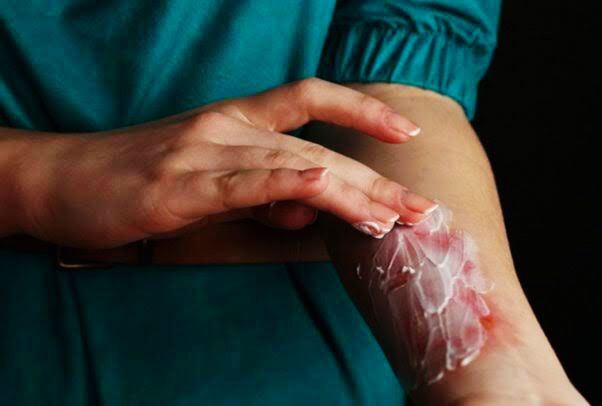Martha Joseph, a teacher in Abuja, is married with four children whom she cares for with much affection. As a mother, she strives to ensure her children’s safety. In the event of an accident, however, she promptly resorts to her trusted toothpaste as a trusted remedy, as she learned from a former neighbor.
“For years now, I have been using toothpaste to treat minor injuries or burns on my children’s skin,” she shared. “My neighbour recommended it, claiming it prevents infections and promotes faster healing,” she stated.
Joseph maintains that she hasn’t observed any adverse effects since using toothpaste to treat her children’s injuries, although she is uncertain about its safety.
Since his undergraduate days, Richard Osifo, another advocate of this practice, has always resorted to toothpaste to treat burns.
“When the sick bay staff were on strike, a friend applied toothpaste to my burn,” he recalled. “He assured me it would alleviate the pain.”
Osifo has since recommended the therapy to many others.
Unorthodox practices such as this are all too common in the country’s history. Most notable was the claim that arose in the wake of the Ebola virus, in 2014, about saltwater being an effective antidote for Ebola. Promptly imbibed by the desperate Nigerians, the practice only increased the death toll.
Through the years, the formulations of toothpaste have expanded to include many more chemical ingredients that erase plaques and enhance teeth whitening. Can these chemical ingredients also find application in treating burns and injuries?
Toothpastes are known to contain abrasives useful for clean and whiten teeth, flavors for freshening the breath and dyes for greater visual appeal. The effective ones are those formulated for maximum bioavailability of the actives.
Despite clear-cut instructions for oral use only, toothpaste, some Nigerian users have come to see it as an effective treatment for early burns.
Finding Facts
However, a study by the Journal of the International Society for Burn Injuries strongly contrasts such claims, suggesting that toothpaste can potentially worsen the burn. By intensifying the pain, the study maintains that toothpaste increase the risk of infection and scarring.
While it acknowledged the long-standing tradition of using toothpaste as a remedy for acne and burns, an article by the burn centre in America maintained that toothpaste is a homeopathic treatment best avoided. The article added that toothpaste is not as effective on the skin as in the mouth. Hence, using it can increase the burning sensation and irritate open wounds, especially if it contains mint.
Chemical constituents of Toothpaste
Sodium fluoride, a common ingredient in toothpaste, is used to prevent cavities by coating the teeth. Although found in most toothpaste and drinking water, sodium fluoride can also be found in pesticides and rat poison. It is known to irritate the eyes, skin, and mucous membranes and can cause cardiac problems and hypercalcemia in high doses.
Glycerol, a non-toxic ingredient in toothpaste, serves multiple purposes, including sweetening, preserving, and preventing drying. While typically sourced from plants and considered safe, glycerol can promote bacterial growth if applied to a wound.
Sorbitol, used with glycerol to maintain toothpaste consistency, is also used as a constipation medication and sugar alternative for individuals with diabetes. However, applying sorbitol to a wound could have adverse effects similar to putting sugar on an injury, potentially encouraging infection or complications.
Calcium carbonate, included in toothpaste as an abrasive to remove plaque, may not be suitable for treating burns. Derived from rocks and mollusk shells, it is also used to treat low blood calcium levels. Excessive consumption can lead to hypercalcemia and digestive problems.
Sodium lauryl sulfate, a detergent added to toothpaste to create foam while brushing, is commonly found in cleaning and personal care products like shampoo. However, it is not intended for use in open wounds or for prolonged periods. It can cause skin irritation, and is even more likely to cause wound irritation.
What the Experts Say
Ibrahim Abdulrashid, a dermatologist, highlighted the risks associated with applying toothpaste to the skin, noting that some individuals resort to such practices without prescription.
Abdulrashid cautioned against daubing toothpaste on burns or injuries, as its chemicals are not intended for skin use and may hinder healing, causing irreversible damage.
Richard Benson, a dentist, expressed shock at the unconventional practice, calling it “ridiculous.”
“It hasn’t been long since I discovered that people do this. It is expected that any case that involves toothpastes is brought to dentists like me, and not skin doctors, because in the first place it is meant for the teeth,” he explained.
Benson assured that toothpastes have nothing to do with skin injuries, highlighting the possibility of a much dire consequence when applied to injuries.
Joseph and Osifo represent a fraction of the general population putting their lives on the line based on unverified claims and information
Martha Joseph, a teacher in Abuja, uses toothpaste to treat her children's minor injuries, a practice she learned from a neighbor. Richard Osifo also advocates using toothpaste for burns, a method shared with him during a staff strike at his school. Despite Joseph not observing adverse effects, scientific studies, including one from the Journal of the International Society for Burn Injuries, indicate that toothpaste can worsen burns by increasing pain and infection risk. Additionally, American burn centers advise against such home remedies, noting that toothpaste ingredients like sodium fluoride and sodium lauryl sulfate can cause skin irritation and are not safe for wounds.
Experts corroborate these findings. Dermatologist Ibrahim Abdulrashid warns against using toothpaste on injuries, citing the potential for irreversible harm due to its chemical composition. Dentist Richard Benson emphasizes that toothpaste is for oral care, not skin treatment, and highlights the danger of unverified claims. The persistent use of such unfounded remedies, as seen historically with other health myths in Nigeria, continues to pose risks to public safety.






